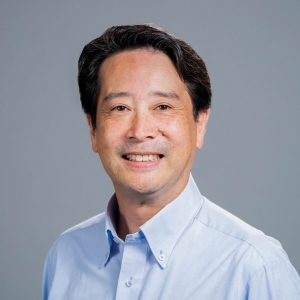Kenichi Soga
447 Davis Hall
Mondays, 4-5pm
Wednesdays, 3-4pm

Kenichi Soga is the Donald H. McLaughlin Professor in Mineral Engineering and a Distinguished Professor of Civil and Environmental Engineering at UC Berkeley. Soga is also the Director of the Berkeley Center for Smart Infrastructure, a faculty scientist at Lawrence Berkeley National Laboratory, and serves as a Special Advisor to the Dean of the College of Engineering for Resilient and Sustainable Systems.
Soga’s research focuses on infrastructure sensing, performance-based design and maintenance of infrastructure, energy geotechnics, and geomechanics from micro to macro. He has published more than 500 journal and conference papers and is the co-author of "Fundamentals of Soil Behavior" with Professor James K Mitchell.
He is a member of the National Academy of Engineering, a fellow of the UK Royal Academy of Engineering, the Institution of Civil Engineers (ICE), the American Society of Civil Engineers (ASCE), and the Engineering Academy of Japan.
He is currently one of the three editors-in-chief of "Data-Centric Engineering".
He has received several notable awards, including the George Stephenson Medal and Telford Gold Medal from ICE in 2006, the Walter L. Huber Civil Engineering Research Prize from ASCE in 2007, the 63rd Rankine lecture in 2025, and the UCB Bakar Prize for his work on commercializing smart infrastructure technologies in 2022.
For more details, please go to
https://smartinfrastructure.berkeley.edu/
http://geomechanics.berkeley.edu/
Ph.D., University of California, Berkeley, 1994
M.Eng., Kyoto University, Japan, 1989
B.Eng., Kyoto University, Japan, 1987
Kenichi’s research focuses on infrastructure sensing through distributed fibre optics sensing, wireless sensor network, energy harvesting, and computer vision. He also focuses on energy geotechnics, city-scale modeling of infrastructure systems, performance-based design and maintenance of underground structures, and geotechnics from micro to macro. Soga’s research group is interested in developing new monitoring technologies, which will provide insight into the behavior of infrastructure, detect anomalies, and provide data for performance analyses. They are also conducting research on city-scale modeling and simulations to evaluate the value of sensing for better management of infrastructure during operation as well as for better response during and after natural disasters such as earthquakes and wildfires. Here are a few of the research projects Soga is currently working on below:
- Sensing Technologies - Sensor technologies and methodologies are created to shape the future of infrastructure and geomechanics through smart data. The collected data enables an assessment of infrastructure behavior in its environment and supports performance analysis. The group develops, tests, and supplies new robust, resilient, and adaptable technologies, such as distributed fiber optic sensors (DFOS), wireless sensor networks (WSN), energy harvesting, and computer vision.
- City-Scale Infrastructure Modeling - In the city-scale modeling group, Soga’s team develops scientific simulation models to capture infrastructure behaviors and integrates them into a “system of systems” model to gain insights. Wildfire is a recurring natural disaster in California and many other parts of the world. Improving current planning and operations involves a complex socio-technical process that spans the environment, organizational structures, communication networks, and human behaviors before, during, and after emergencies. In this theme, Soga’s research group has developed and deployed three interconnected models covering fire progression, communication processes, and traffic evacuations. We have collaborated with designers, game developers, social scientists, fire and traffic agencies, and local communities to create a streamlined process from academic research to social impact.
- Geomechanics - Soga’s team conducts research in fundamental geomechanics, soil behavior, and computational geomechanics. The work includes both theoretical and experimental studies, as well as developing advanced computational tools like the Material Point Method (MPM) and Finite Element Method (FEM). This research is applied to areas such as landslides, tunneling, deep excavations, foundations, soil-pipeline interactions, geothermal energy, and deep borehole drilling.
- Shallow Geothermal Energy - Shallow geothermal energy is an emerging renewable, green energy that can supply heating and cooling for buildings in a safe, non-emitting, and affordable manner, thereby decreasing reliance on natural gas. Soga’s research group is investigating the potential of shallow geothermal energy through in-situ geothermal studies, city-scale geothermal simulation and optimization, and the development of an advanced energy delivery system.
- Machine Learning for Construction and Infrastructure - Soga's team utilizes and develops data analytics techniques to better understand and solve complex problems in underground construction and infrastructure.
Books
Mitchell, J.K. and Soga, K. (2005) Fundamentals of Soil Behavior, 3rd Edition, John Wiley and Sons, May 2005, 592pp.
Soga, K., Kumar, K., Biscontin, G. and Kuo, M. (editors) (2014) Geomechanics from Micro to Macro - Proceedings of the TC105 ISSMGE International Symposium on Geomechanics from Micro to Macro, IS-Cambridge 2014, CRC Press, 1700pp.
Mair, R.J., Soga, K., Jin, Y., Parlikad A.K. and Schooling, J.M. (editors) (2016) Transforming the Future of Infrastructure through Smarter Information: Proceedings of the International Conference on Smart Infrastructure and Construction, ICE Publishing, 800pp.
Rodenas-Herráiz, D., Soga, K., Fidler, P. and de Battista, N. (2016) Wireless Sensor Networks for Civil Infrastructure Monitoring - A Best Practice Guide, ICE Publishing, 208pp.
Kechavarzi, C., Soga, K., de Battista, N, Pelecanos, L., Elshafie, M. and Mair, R.J. (2016) Distributed Optical Fibre Sensing for Monitoring Geotechnical Infrastructure - A Practical Guide, ICE Publishing, 192pp.
Fern, J., Rohe, A., Soga, K. and Alonso, E. (2019) The Material Point Method for Geotechnical Engineering: A Practical Guide. CRC Press, 420pp.
Fellowships
2023
Member, National Academy of Engineering
2022
International Fellow, Engineering Academy of Japan, Japan
2020
Fellow, American Society of Civil Engineers, US
2013
Fellow, Royal Academy of Engineering, UK
2007
Fellow, Institution of Civil Engineers, UK
Awards/Honors
2025
The 63rd Rankine Lecture
International Lifetime Contribution Award, Japan Society of Civil Engineers
2024
The 11th Pedro de Alba Lecture, University of New Hampshire
2022
Bakar Prize, UC Berkeley
2019
Bakar Fellow, UC Berkeley
Sowers Lecture, Georgia Institute of Technology
2017
Jennings Memorial Lecture, South African Geotechnical Society
Schiffman Lecture, Cornell University
2016 Best Paper Award, ASCE Journal of Computing in Civil Engineering
2016
International Collaboration Award, Japan Society of Civil Engineers
Lumb Lecture, Hong Kong Institute of Engineers/University of Hong Kong
2015
Skempton Lecture, ECSMGE
Crampton Prize, Institution of Civil Engineers
Osterberg Lecture, Northwestern University
2013
Croce Lecture, Italian Geotechnical Association
2012
Fellow, School of Engineering, University of Tokyo
2010
Telford Gold Medal, Institution of Civil Engineers
2007
Geotechnique Lecture, British Geotechnical Association
Walter L. Huber Civil Engineering Research Prize, American Society of Civil Engineers
Crampton Prize, Institution of Civil Engineers
2006
George Stephenson Medal, Institution of Civil Engineers
1989
Murata Overseas Scholarship
News
Spotlights
No mentions in Spotlights


